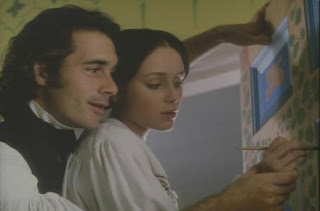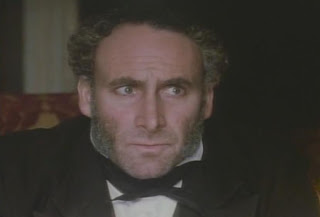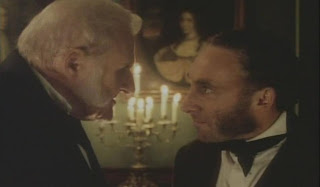"Big man as he was, he trembled at the idea of what he had to say..."
Today there has been a merry gathering of ladies coming from various parts of the world in London organized by members of
C19 . They celebrated
BBC 2004 NORTH & SOUTH's fifth birthday. It was in fact first aired in November 2004. Since I couldn't join them there, I thought I could take part in the celebration dedicating my Saturday Night Classic Reading to
re-reading and re-watching Gaskell's NORTH AND SOUTH
This novel is one of my favourite ever and its BBC adaptation is one my best-loved costume dramas. So if you have time, I've prepared this long multimedia posting ...Tomorrow is Sunday, isn't it?

When Margaret Hale arrives in Milton - in the industrial northern district of England - she is so disappointed by the bleak, smoky, noisy, grey atmosphere of the place. Her father has left the Church and decided to uproot his family from Helstone , in the beautiful countryside of the South of England. Margaret is greatly prejudiced against the people from the North and their rather direct, almost wild manners. So she starts idealizing the South.
Mr Bell, one of Mr Hale’s former university mates, suggested them to settle in Milton where he owns a cotton mill run by his tenant, Mr John Thornton. Mr Thornton helps the Hales to find accomodation and becomes Mr Hale’s friend and pupil. He is handsome and smart, self-confident and successful in his job, greatly appreciated in Milton both as an entepreneur and a magistrate.
Margaret instead doesn’t like him at all , she doesn’t hide her dislike of him and often argues with him when he comes round as one of Mr Hale’s private pupils. He represents everything Margaret despises in the North, especially now that she has started making new acquaintances among the working people and sympathising with their struggle against their masters. She makes friends to the Higgins, Bessy who suffers from an illness caused by her past work in a cotton mill, and her father, Nicholas, a strong-willed worker and one of the leaders of the Union.
Mr Thornton is attracted by Margaret’s beauty and by her firmness; her strong personality and her cold detached manners soon win him. She, perhaps, reminds him his mother to whom he has been deeply attached since his father committed suicide in a moment of financial difficulty. Young Thornton, then, had to work hard to pay back his father’s debts and to provide for his mother and sister. He is a self – made man and he is proud of his accession in society.
But, unfortunately, he is not a gentleman in Margaret’s eyes and she continues siding with the workers. Until one day some of them organize a riot against Mr Thornton. The workers have been on strike for about a month to protest against their lowered wages. All the mills in Milton have stopped their activities, the workers’ families are starving, when they heard that Mr Thornton has brought in black – leg workers from Ireland. Their rage mounts and they are ready to attack the unfortunate Irish hidden at Marlborough Mill. Margaret is, by chance, visiting the Thorntons just on that day and she finds herself involved.
She prompts Thornton to face the furious crowd and to defend the poor Irish workers from their violence:
“ Mr Thornton, go down this instant, if you are not a coward. Go down and face them like a man. Save the poor strangers, whom you have decoyed here. Speak to your workmen as if they were human beings. Speak to them kindly. Don’t let the soldiers come in and cut down poor creatures who are driven mad”
(E. Gaskell, North and South, chap. XXII, vol.I).
But when she realizes she has put him in terrible danger, since some of the boys and men in the crowd have wooden clogs in their hands and are ready to throw them at him, she puts her arms around Thornton and makes her body a shield between him and their rage. She takes a blow on her forehead and faints, before the soldiers arrive the workers retreat and run away.
Her action is completely misinterpreted by John Thornton who proposes to Margaret the next morning. The girl is even offended by his proposal and rejects him firmly, expressing all her contempt: “Your way of speaking shocks me. It is blasphemous. I cannot help it … but your whole manner offends me . … You seem to fancy that my conduct of yesterday …was a personal act between you and me; and that you may come and thank me for it, instead of perceiving, as a gentleman would … that any woman, worthy of the name of woman, would come forward to shield... a man in danger from the violence of numbers”(E. Gaskell, North and South, chap. XXIV, vol. I)
NOW , TAKE SOME TIME TO WATCH AND LISTEN TO GREG WISE READING THE ENTIRE PROPOSAL SCENE FROM THE BOOK (CLICK ON THE URL BELOW THE PICTURE ) ; THEN, IF YOU WANT, YOU CAN COMPARE THE TEXT WITH THE SAME SCENE IN THE BBC ADAPTATION.

Margaret has got a brother,Frederick, a navy officer who lives in forced exile since he led a mutiny against a violent unfair captain. He can be hanged as a traitor if caught. Since Mrs Hale’s delicate health and her “low spirits”, have brought her to serious illness, Margaret has written to him, and he risks his life in order to see their dying mother once again. He secretly arrives and as secretly leaves the house at night before the funeral .But he and Margaret are seen that night by Mr Thornton at the station while departing. Thornton thinks they are lovers and doubts Margaret’s honourability since she is out alone with a man at night. Moreover, an old acquaintance of the family recognizes Frederick, the two men fights, young Hale succeeds in leaving Milton safe but … the next morning the man, named Leonard is found dead in the street and. even worse, someone witnessed the whole scene the previous night and told the police.
A police inspector visits Margaret and asks her if the night of Leonard’s death she was out with a young man, because someone- one of the porters at the station - watched a beautiful young lady with a handsome young man , the same person saw the two men fighting and would swear the lady was Margaret, he is sure. She denies as convincingly as she can: she has to protect her brother. The inpector leaves saying that the case will be followed by Milton magistrate, John Thornton.
Mr Thornton, though doubting Margaret’s morality and truthfulness, decides there will be no further enquiry due to lack of evidence. Thornton wants to spare his friend, Mr Hale, from any involvement in the case: he has just lost his wife and is so depressed! But he, of course, wants also to save Margaret from shame. The girl’s reaction is confused and troubled: “
Mr Thornton had seen her close to Outwood station on the fatal Thursday night, and had been told of her denial that she was there. She stood as a liar in his eyes.…Oh, had anyone such just a cause to feel contempt for her? Mr Thornton, above all people, on whom she had looked down from her imaginary heights till now! She suddenly found herself at his feet, and was strangely distressed at her fall.”(E. Gaskell, North and South, vol.II , chap. X)
Margaret’s troubles have not ended, unfortunately. Her father ,too , dies. She is completely alone and has no reason to stay in Milton. Now she has started changing her attitude towards the north and its inhabitants, especially Mr Thornton, she has to leave. She is going to move to London with her aunt, Mrs Shaw, her cousin Edith and her husband Captain Lennox. She also discovers that Mr Bell, her father’s friend who owns Marlborough Mill , wishes to make her his heiress: she will inherit his patrimony when he dies.
Mr Bell suddenly dies and Margaret becomes rich just when , Mr Thornton, now her tenant, is in great financial difficulties and has to leave his position at Marlborough Mill. When Margaret hears about Thornton’s disgraced situation decides to help him…She meets him in London … she has a business proposition for him : she receives very little interest for the money she has in the bank. She offers him a great sum he can dispose of to run Marlborough Mill. He will run the mill for her , she is sure he will give her a much higher interest.
It is the start of a different relationship between them….
The TV version reflects Gaskell's atmospheres and characterizations but it has taken its liberties from the book, for instance ... the final scene... Margaret and John meet again at a train station, halfway between Helstone and Milton. It is a really effective, romantic, moving finale but totally different from the ending pages of the novel which take place in Margaret's cousin's house in London. The protagonists in the book hug in the sitting-room, hidden from indiscreet looks. Instead, quite unbelievable for mid-19th century Victorian England, in the movie the two ... well ... have a look at this CLIP ....








.jpg)








































